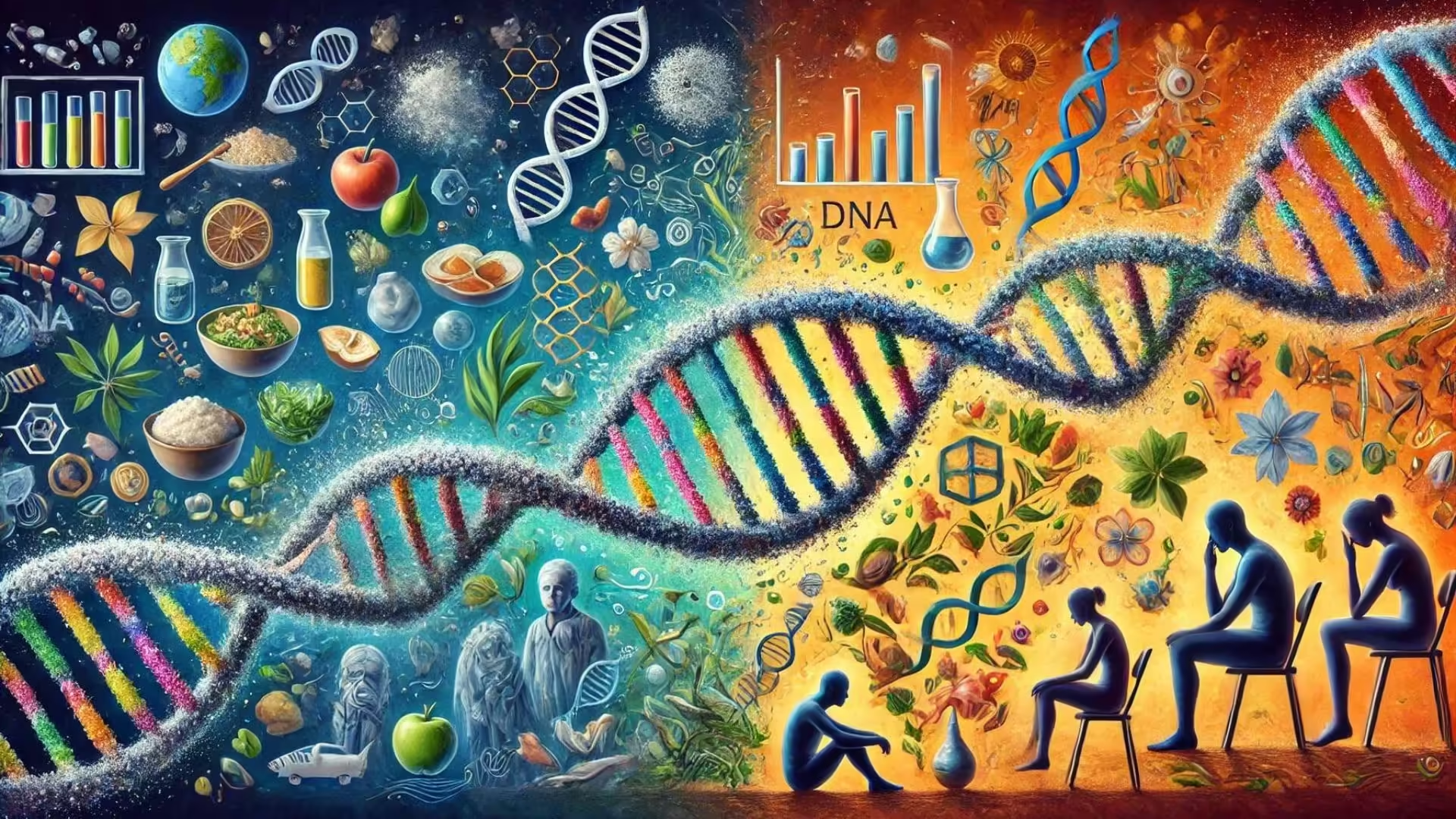Imagine waking up every day knowing that the choices you make—from the food you eat to the stress you manage—don’t just affect you in the moment but could influence your health for years to come. Even more intriguing, these choices could impact the health of your children and grandchildren. This is where the fascinating world of epigenetics comes into play, offering a new lens through which we can understand the profound connection between our environment, lifestyle, and our genes.
What Is Epigenetics?
Epigenetics is the study of how behaviors and environmental factors can cause changes that affect the way your genes work. Unlike genetic changes, epigenetic changes are reversible and don’t alter your DNA sequence. However, they can change how your body reads a DNA sequence.
Think of your DNA as a book full of instructions. Epigenetics doesn’t change the words in the book; instead, it adds bookmarks, highlights, or even erases certain parts, determining how and when your body follows those instructions. These epigenetic marks can be influenced by various factors such as diet, stress, exposure to toxins, and even social experiences.
Real-Life Examples of Epigenetics
Consider two identical twins. Despite having the same DNA, one twin might develop a chronic illness while the other remains healthy. How is that possible? The answer lies in epigenetics. While both twins share the same genetic code, their different lifestyles and environments might trigger different epigenetic marks, leading to divergent health outcomes.
Another compelling example is the impact of maternal nutrition on offspring. Research has shown that a mother’s diet during pregnancy can influence the baby’s epigenetic marks, potentially affecting the child’s risk of developing conditions like diabetes or obesity later in life. This underscores the importance of nutrition and lifestyle choices even before a baby is born.
Why Understanding Epigenetics Matters
Understanding epigenetics empowers us to take control of our health in ways we might not have imagined before. It highlights the importance of making informed lifestyle choices—not just for our own well-being but for the well-being of future generations.
For instance, regular exercise, a balanced diet rich in fruits and vegetables, and stress management can all have positive epigenetic effects. On the other hand, smoking, excessive alcohol consumption, and exposure to environmental toxins can lead to harmful epigenetic changes, increasing the risk of various diseases.
Shape Your Genetic Destiny
The study of epigenetics offers a powerful message: while we can’t change the genes we inherit, we can influence how they express themselves. This means that by making healthier choices today, you have the power to shape not just your own health but potentially the health of future generations.
Start small. Incorporate more whole foods into your diet, find a form of exercise you enjoy, and practice mindfulness or other stress-reduction techniques. These seemingly simple actions can set off a chain reaction of positive epigenetic changes, helping you to live a longer, healthier life.
In the end, understanding and embracing the principles of epigenetics isn’t just about personal responsibility; it’s about realizing the profound interconnectedness of our choices, our genes, and our future. The time to take action is now—your future self, and possibly even your descendants, will thank you for it.
Expand Your Vocabulary
- Epigenetics
Context: Epigenetics refers to the study of how behaviors and environmental factors can cause changes that affect the way your genes work.
Meaning: In everyday English, epigenetics helps us understand that while our genes are fixed, the way they express themselves can change based on our lifestyle and environment. It’s like having a recipe that you can tweak to create a slightly different dish each time. - DNA Sequence
Context: Your DNA sequence is like a book full of instructions for how your body should function.
Meaning: This term is often used in genetics to describe the order of nucleotides in our DNA, which carries genetic information. In daily conversations, it can be used metaphorically to refer to any set of detailed instructions or a blueprint. - Environmental Factors
Context: Environmental factors like diet, stress, and exposure to toxins can influence our genes.
Meaning: These are external elements that affect our health and well-being. In everyday language, environmental factors could refer to anything in our surroundings that impacts our decisions or actions, like weather, social situations, or work conditions. - Reversible
Context: Epigenetic changes are reversible, meaning they can be undone or modified.
Meaning: Something that is reversible can be changed back to its original state. In everyday use, this word might describe a decision or action that can be taken back or corrected, like a reversible decision in a job or a reversible jacket that can be worn inside out. - Chronic Illness
Context: One twin might develop a chronic illness while the other remains healthy due to different epigenetic influences.
Meaning: A chronic illness is a long-lasting health condition that may not have a cure. In daily life, this term is often used to describe persistent issues, not just in health but in other areas like chronic stress or chronic traffic problems. - Nutrition
Context: A mother’s diet and nutrition during pregnancy can influence her baby’s epigenetics.
Meaning: Nutrition refers to the intake of food and how it nourishes the body. It’s a common term used in health discussions about diet, meal planning, and overall wellness. - Mindfulness
Context: Practicing mindfulness or other stress-reduction techniques can have positive epigenetic effects.
Meaning: Mindfulness is the practice of being present and fully engaged with whatever you’re doing in the moment. In daily life, it’s often recommended as a way to reduce stress and improve focus and well-being. - Gene Expression
Context: Epigenetics changes how your body reads a DNA sequence, affecting gene expression.
Meaning: Gene expression is the process by which the instructions in our DNA are converted into a functional product, like a protein. In a broader sense, it can be used to describe how potential or abilities manifest in real life, like expressing one’s talent through art. - Interconnectedness
Context: Understanding epigenetics reveals the profound interconnectedness of our choices, our genes, and our future.
Meaning: Interconnectedness refers to the state of being connected with each other. It’s a term often used in discussions about how different aspects of life, society, or the environment are linked together. - Empower
Context: Understanding epigenetics empowers us to take control of our health.
Meaning: To empower means to give someone the authority or power to do something. In everyday language, it’s often used in the context of enabling people to take charge of their lives, decisions, or actions.
Let’s Talk
- How much control do you think we have over our genetic destiny through our lifestyle choices? Can understanding epigenetics help you make better health decisions?
- Have you ever considered how your environment or diet might be affecting your health or even your children’s future health? What changes could you make today to promote better gene expression?
- Mindfulness and stress management are often highlighted as beneficial for overall well-being. Do you think these practices can have a tangible impact on your genetic health? Why or why not?
- Considering the role of epigenetics, how important do you think it is to maintain a healthy lifestyle not just for yourself but for future generations?
- If certain behaviors can influence your genes in a positive or negative way, what are some lifestyle changes you would consider making?
- Do you believe that knowing about epigenetics could motivate you to take more responsibility for your health? How might this knowledge change your approach to daily habits?
- How can understanding the interconnectedness of our choices and their impact on our genes influence your approach to challenges like stress or diet?
- In what ways can you empower yourself and others to make healthier choices that could positively affect gene expression?
- Do you think schools should include more education on epigenetics to help young people make informed choices about their health? Why or why not?
- How might epigenetics influence your understanding of “nurture vs. nature” in shaping who we are? Which do you think plays a bigger role in our development?
These questions are designed to provoke thought, encourage discussion, and help you dive deeper into the intriguing world of epigenetics. Share your thoughts in the comments or discuss them with friends and family to further explore how your daily choices might be influencing your genetic future.










0 Comments